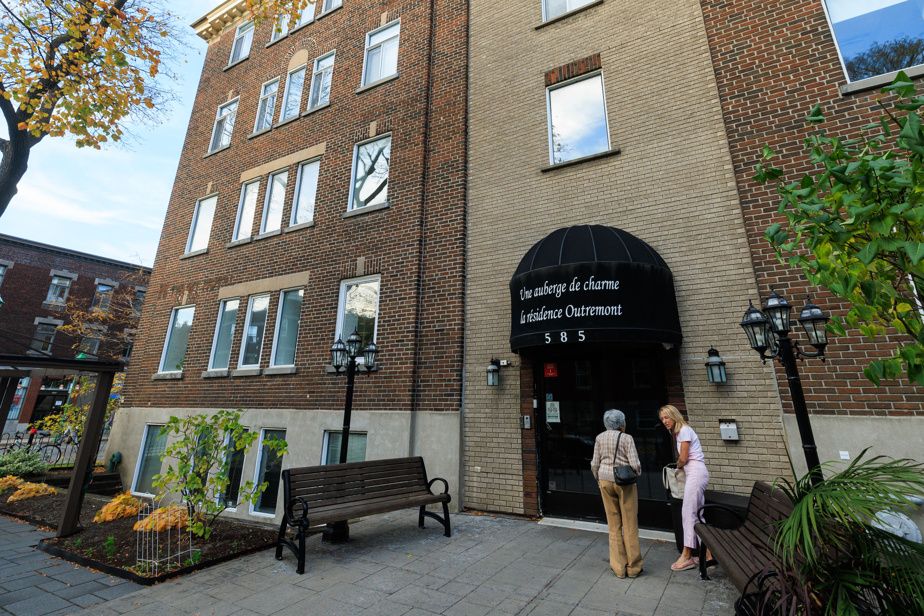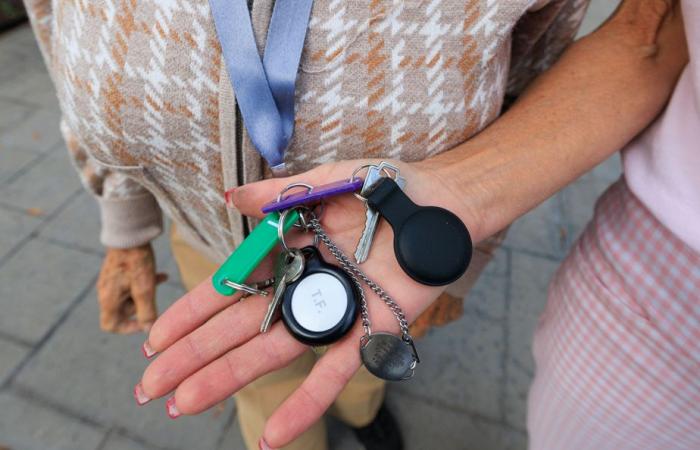The solution for their residence? The AirTag tracking device.
Published at 7:45 p.m.
At the Outremont residence in Montreal, there is no question of confining residents suffering from cognitive disorders, even if they tend to move away. Management found an ingenious solution to ensure their safety: an AirTag tracking device. An initiative that brings peace of mind to families.
What you need to know
- Six residents with cognitive disorders at the Outremont residence in Montreal wear AirTags at all times.
- If a resident is absent, a staff member locates them and can quickly find them, even if they are outside the establishment.
- This initiative makes it possible to maintain the person’s freedom while preserving a safety net, believes the daughter of a resident.
For three years, Teresa Fernandez has constantly worn an AirTag attached to her key ring. The 87-year-old woman, who suffers from Alzheimer’s, has always been a great walker. “It worried us, because cognitive losses were becoming more and more problematic. The AirTag allows her to move as much as she wants and restrict her freedom as little as possible,” says her daughter Katia Paradis.
M’s three childrenme Fernandez and the Outremont residence team have access to his location at all times. “It helped us a lot,” says M.me Paradis.
Teresa Fernandez’s family was already using this device before she moved into the Outremont residence two months ago. The family was delighted to learn that the management of the establishment was also using this solution. “We found it very reassuring,” she said.
Attached to the key ring or slipped into a handbag, 6 of the 35 residents of the Outremont residence carry AirTags at all times. “It works really well,” exclaims the founder of the residence, Line Vincelli, who set up this initiative.
PHOTO HUGO-SÉBASTIEN AUBERT, THE PRESS
For three years, Teresa Fernandez has constantly worn an AirTag attached to her key ring.
Apple’s tablets, sold for around $40, allow you to find lost items such as keys, suitcases or wallets. The location of these devices is accessible via the application Locateon iPhones and other brand devices.
With the consent of the families, management chose to equip its residents with cognitive disorders with this tool. If one of them is absent during the floor tour, a member of staff locates them and can quickly find them, even if they are outside the establishment.
“I always pretend that I came across them by chance and we continue to walk together. I don’t want them to feel like they’re being followed,” says Mme Vincelli.
Privacy issues
Katia Paradis is nevertheless aware that this initiative may raise certain issues related to the private lives of seniors.
It’s a delicate question, but I think that in a case of close assistance, it allows freedom to be maintained while preserving a safety net.
Katia Paradis
The resident does not need to own an iPhone for the AirTag to locate them. The device uses Bluetooth wireless technology to connect to any nearby Apple device within a radius of ten meters. The owner of a “relay” iPhone does not know that it helps locate an AirTag or who it belongs to.
When she goes for a walk, Teresa Fernandez’s location may remain unavailable for a few minutes, until she encounters someone with an Apple device, allowing her to be located again.

PHOTO HUGO-SÉBASTIEN AUBERT, THE PRESS
With the consent of the families, the management of the Outremont residence chose to equip its residents with cognitive disorders with AirTags.
“If she doesn’t pass anyone while walking, we don’t know precisely where she is, but it still allows us to know if she has left her usual walking area. When we realize that she has gone too far and seems lost, we can go find her in the street and bring her back safely,” says M.me Paradis.
Katia Paradis is aware that there are risks in letting a person suffering from cognitive loss walk alone. “But you have to learn to develop a tolerance for risk so that the person can continue to move and have positive things in their life,” she believes.
“That reassures me a lot”
Line Vincelli has long been looking for a solution to ensure the safety of seniors with cognitive disabilities, without preventing them from going out.
Everyone needs to go for a walk and get some fresh air. I am totally against imprisoning seniors. They are not prisoners after all.
Line Vincelli, founder of the Outremont residence
Before, as soon as a person left, an employee would notify them and they would monitor them remotely until they decided to come back. “But with the chip, it reassures me a lot more. I am calm. »
The staff members adapt to the different residents, whom they know “by heart”. If one of them always carries their keys around their neck, they attach the AirTag there, while for another who always has their purse, they slip it inside. Management always keeps a few devices in reserve in their office. “As soon as there is danger, we install it,” says Mme Vincelli.







